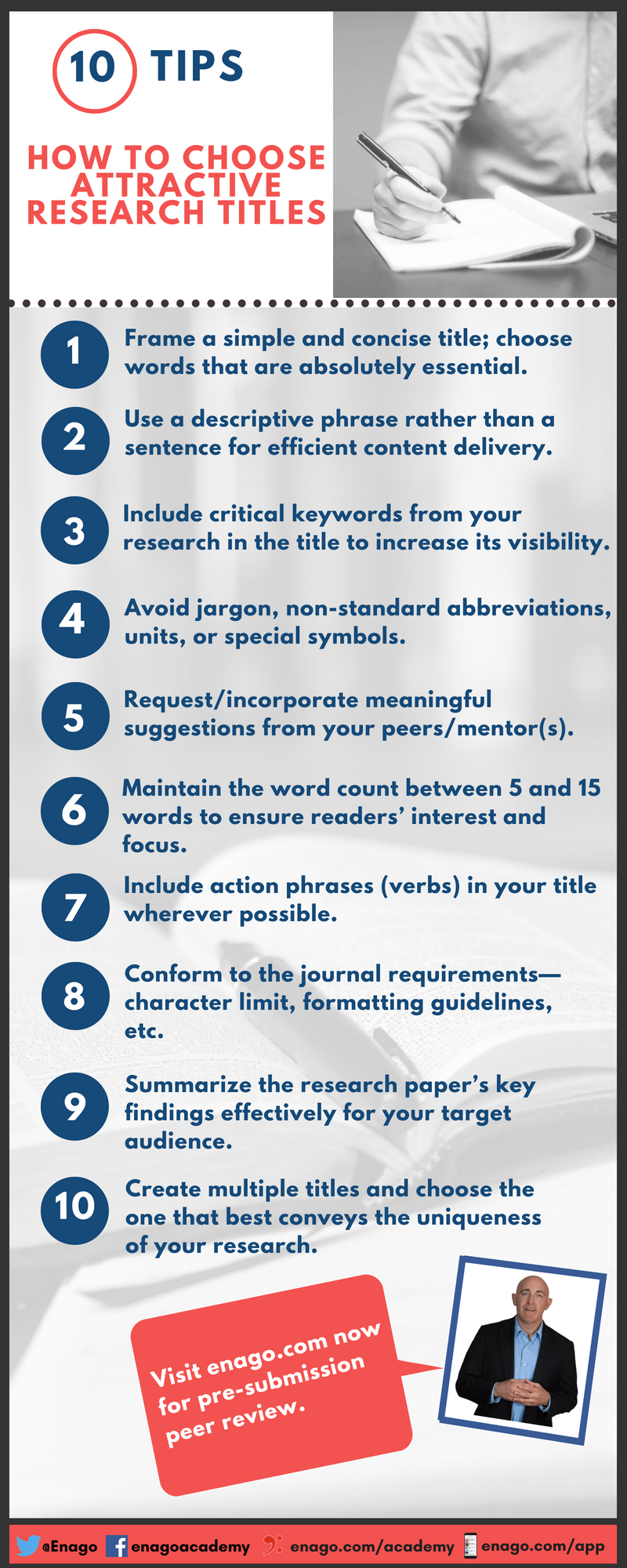Writing a Good Research Title: Things to Avoid

When writing manuscripts, too many scholars neglect the research title. This phrase, along with the abstract, is what people will mostly see and read online. Title research of publications shows that the research paper title does matter a lot. Both bibliometrics and altmetrics tracking of citations are now, for better or worse, used to gauge a paper’s “success” for its author(s) and the journal publishing it. Interesting research topics coupled with good or clever yet accurate research titles can draw more attention to your work from peers and the public alike.
It would be helpful to have a list of what should never go into the title of a journal article. With this “don’ts” list, authors could have a handy tool to maximize the impact of their research. Titles for research manuscripts need not be complex. It can even have style. They can state the main result or idea of the paper (i.e., declarative). Alternatively, they can indicate the subject covered by the paper (i.e., descriptive). A third form, which should be used sparingly, conveys the research in the form of an open question.
A Handy List of Don’ts
- The period generally has no place in a title (even a declarative phrase can work without a period)
- Likewise, any kind of dashes to separates title parts (however, hyphens to link words is fine)
- Chemical formula, like H2O, CH4, etc. (instead use their common or generic names)
- Avoid roman numerals (e.g., III, IX, etc.)
- Semi-colons, as in “;” (the colon, however, is very useful to make two-part titles)
- The taxonomic hierarchy of species of plants, animals, fungi, etc. is not needed
- Abbreviations (except for RNA, DNA which is standard now and widely known)
- Initialisms and acronyms (e.g., “Ca” may get confused with CA, which denotes cancer)
- Avoid question marks (this tends to decrease citations, but posing a question is useful in economics and philosophy papers or when the results are not so clear-cut as hoped for)
- Uncommon words (a few are okay, but too many can influence altmetric scoring)
- Numerical exponents, or units (e.g. km-1 or km/hr)
- Vague terms (e.g., “with” could be re-written with a more specific verb; “amongst” rectified by simpler word ordering)
- Cryptic/complex drug names (use the generic name if allowed to)
- Obvious or non-specific openings with a conjunction: e.g., “Report on”, “A Study of”, “Results of”, “An Experimental Investigation of”, etc. (these don’t contribute meaning!)
- Italics, unless it is used for the species names of studied organisms
- Shorten scientific names (not coli, but write instead Escherichia coli)
- Keep it short. Aim for 50 to 100 characters, but not more (shorter titles are cited more often) or less than 13 words
Related: Finished preparing your manuscript? Check out this post now for additional points to consider submitting your manuscript!
Use the List
Take some time out to look at a good research title example. It could be one that you liked or a recognized collection of best research titles. Discuss these with your colleagues and co-authors. Write several title drafts in various forms, either in the declarative or descriptive form, with or without a colon. Then use the list above as a guide to polish and winnow your sample research title down to an effective title for your manuscript.
A great title should interest the reader enough to make him/her want to download your paper and actually read it. Importantly, in selecting the words, aim to both pique the reader’s curiosity and sum up the research work done. Bear mind, too, that a good title should also ensure your publication is easily found. This is now crucial for digital indexing and archiving purposes.

Research Titles in the 21st Century
Remember, a good research paper title is now essential. However, it is no substitute for good quality science and scholarship. Exaggerated or sensational titles, especially those that make unwarranted generalizations, may well get more attention from the media. Given the growing use of Twitter and other social media platforms, the research paper title is clearly gaining value and importance. Title research, therefore, is critical to understand what effect a given type or use of a research title has on its readership.
Did you like this post? Will it help you choose a good title for your next report/manuscript? Please share your comments in the section below.







Good article, but I think that before writing the title and the paper itself, you need to choose a topic for which to write and the topic should be simple and understandable for yourself.
Great post! Helped me in my research project title selection. Sharing it with my fellow classmates as well!
thank you. it helps me to choose my title as well.thanks
very useful and handy article
Yes its so very thankful to guided to me how to created research title
this post is so helpful, it will rapidly assist me to generate perfect title